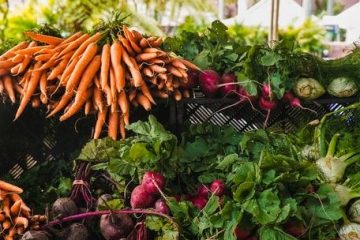We might not like to talk about it, but we all do it – poop. It is a natural and necessary part of our lives. What we eat plays a big role in how our bodies function, and our poop is no exception. That’s why eating the right foods can help us stay regular and have healthy bowel movements.
The average person spends about a year and a half of their life pooping. So it makes sense that we all want healthy bowel movements. And what better way to have healthy bowel movements than to eat vegetables that help you poop? Here are some vegetables that help you poop.
Constipation is a common digestive system problem, characterized by hard stools, infrequent bowel movements, or a feeling of incomplete evacuation. The opposite of constipation is diarrhea. Although it may be uncomfortable and embarrassing to talk about, constipation is a medical condition that affects people of all ages. According to the National Institutes of Health (NIH), about 4 million Americans suffer from frequent constipation.
Vegetables are an important part of a healthy diet and can help you poop. Some vegetables that help you poop are broccoli, kale, and spinach. These vegetables are high in fiber, which helps your body move food through your digestive system. Eating a diet that includes these vegetables can help you avoid constipation and other digestive problems.
Healthy diet should include plenty of fiber-rich foods, since fiber helps keep your digestive system running smoothly. But not all fiber sources are created equal — some are particularly good at helping you poop regularly and in comfortable fashion.
Vegetables are not only healthy for you, but they can also help you poop. That’s right, certain vegetables can act as natural laxatives and can help to relieve constipation. Here are ten of the best vegetables that help you poop. If you’re having trouble going to the bathroom, try incorporating some of these vegetables into your diet.
Here are top 10 vegetables that help you poop and have a healthy bowel movement every day. These excellent high-fiber food choices also hints on how to use them most effectively to help you poop when necessary. You’ll be pooping like clockwork in no time!
Table of Contents
10 Vegetables that Help You Poop
Spinach
The human digestive system does amazing things. Every day, it breaks down the food we eat and converts it into the energy that our bodies need to function. When things go wrong with our digestive system, we often end up with uncomfortable — and sometimes embarrassing — problems. For example, we may get constipated or have diarrhea.
Spinach is a leafy, green vegetable rich in vitamins, minerals, and other nutrients. It has long been known as a health food, and recent research has shown that it may also be effective in relieving constipation.
A study published in the Journal of the American Dietetic Association found that spinach was helpful in relieving constipation in a group of adults. The study participants who ate spinach reported less difficulty with bowel movements and less abdominal pain than those who did not eat spinach
There’s a reason Popeye ate his spinach—spinach is packed with both soluble and insoluble fiber, which help keep things moving smoothly through your digestive tract. One cup of cooked spinach contains around 7 grams of fiber.
Fruits and vegetables are key components to any healthy diet because they contain essential vitamins, minerals, antioxidants, and other nutrients that support good health. While we need some vitamins from external sources like supplements or food, our bodies actually produce most of what we need on their own.
Getting enough fruits and vegetables ensures you’re getting everything you need without all of those extra calories in dietary supplements.
Broccoli
Broccoli is a vegetable high in fiber and other nutrients that may help with constipation. It is a good source of vitamin C, folate, vitamin K, and potassium. Additionally, broccoli contains glucosinolates, which are natural compounds that may help to break down fecal matter.
The fiber in broccoli helps your body eliminate waste and other materials and is the reason that make broccoli one of the best vegetables that help you poop. For example, potassium helps your kidneys get rid of excess fluid. Foods high in fiber also slow down how quickly food passes through your intestines, giving your body more time to absorb nutrients.
Fiber can even help prevent hemorrhoids and constipation! The health benefits of broccoli aren’t just limited to your digestive system; it also contains many vitamins, minerals, antioxidants and phytochemicals (naturally occurring chemicals found in plants).
Broccoli is also a source of glucoraphanin—an antioxidant that may have anti-cancer properties. Just half a cup has more than 100 percent of your daily value for vitamin C—good news for fighting colds and infections!
Additionally, broccoli is a great source of vitamins and antioxidants, which can help improve your overall health.
Cauliflower
This is actually a cruciferous vegetable. It is loaded with vitamin C and K, which work together to help eliminate toxins from your liver and your bloodstream. This helps them get eliminated much faster, which is especially helpful if you are detoxing due to eating something disagreeable.
They also help your liver to maintain a good balance of good versus bad cholesterol, which not only helps you poop but it can help prevent heart disease as well.
In addition, they are high in fiber, which aids in digestion and makes you poop regularly because of its natural laxative effects. As an added bonus they are low calorie and only have about 22 calories per cup!
Carrots
Constipation can be incredibly uncomfortable and make going about your day-to-day life a real pain. (No pun intended). Luckily, there are a few vegetables that can help get things moving along. Carrots are one of those vegetables.
Carrots are good for your skin, teeth, and eyes. And did you know they’re also good for your gut? Like many other vegetables, carrots help by keeping things moving in your intestines. I suggest eating about a half-cup of carrot sticks at every meal.
If you don’t like carrots raw, try making them into soup or even baby food! There are plenty of options out there to make vegetables taste great—I’m sure you’ll find one you like!
Fennel
Fennel, a vegetable that is high in fiber and potassium, can help you poop more easily. The fiber in fennel helps to bulk up the stool and the potassium aids in the metabolism of fecal material. Additionally, consuming fennel seeds can help to keep your bowels regular.
Fennel is a powerful stomach and colon cleanser and is one of the best vegetables that help you poop. In fact, fennel is one of only a few herbs that has long been used as a laxative. The active ingredients in fennel are volatile oils called anethole and estragole.
According to Michael Tierra, FNP, author of The Way of Herbs, these oils stimulate nerve endings in your colon, which can help relieve constipation. Some people may have trouble digesting raw fennel seeds.
Fennel is a vegetable that has been used for centuries to help with constipation and bowel movements. The flavonoids and fiber found in this vegetable can help to move your bowels and improve your overall digestion.
Try them boiled to make them easier on your system. Or you can try cooking with fennel as part of your regular diet — use it as you would celery in salads or sautéed vegetables.
Peas
Constipation is a common problem that can be difficult to solve. Many vegetables have been shown to have beneficial effects on bowel movements, but few are as well-known as peas. Peas are a great source of fiber, which can help to bulk up the stool and promote regularity.
In addition, peas are a good source of vitamins and minerals, including potassium and magnesium, both of which have been shown to be beneficial for constipation.
Peas might look like vegetables but they’re actually seeds. That being said, they do a good job of helping you poop and you can even use them in smoothies to make them taste better! Blending fruits and vegetables together is a great way to hide your veggies from picky eaters.
Celery
The idea behind adding more celery to your diet is simple: The fibrous, crunchy veggie contains a compound called 3-n-butylphthalide (or 3nB), which gets your body to produce more of a hormone called acetylcholine.
Acetylcholine can help promote muscle contraction and improve bowel movements. To make sure you’re taking in enough celery each day, stick with raw veggies or vegetable juice when possible. Stick with organic celery as well, since conventionally grown celery has been found to have high levels of pesticides.
Remember that adding more celery might not be all you need to do in order to stimulate regular bathroom visits. A varied diet full of fresh fruits and vegetables will give your whole digestive system a healthy dose of fiber; foods rich in soluble fiber are especially effective at getting things moving along.
Fresh fruit also promotes healthy digestion by giving you extra vitamins, minerals, enzymes, phytonutrients and antioxidants throughout the day — so there’s no reason not to eat at least one serving every day for good health!
Pumpkin seeds
One of my personal favorites! It’s low in calories, high in fiber and protein, great for digestion and it doesn’t cause gas. If you have trouble moving your bowels, a few handfuls should do the trick.
The only downside is they are quite hard so if you can’t chew them then try grinding them up before eating (just don’t let anyone see you doing it!). Ground pumpkin seeds can be mixed with yoghurt and frozen into a Popsicle-type shape – delicious!
Add some raw pumpkin seeds to salads or your favorite trail mix to keep you regular. Pumpkin contains special compounds known as protease inhibitors which can help counter diarrhea caused by an imbalance of bacteria in your gut called dysbiosis.
Protease is an enzyme that breaks down proteins, particularly those found in our food. When excess proteases remain after consuming a meal they begin to break down proteins around us creating inflammation and pain.
Garlic
Garlic is a staple of any immune-boosting diet, and it’s also an effective treatment for constipation. It works by loosening up mucus in your digestive tract and stimulating gastric juices—both actions make it easier to go to the bathroom.
Adding garlic to your favorite recipes or munching on it raw is an easy way to include more garlic in your diet. Another option? Aged garlic extract supplements. Studies show they work just as well as eating fresh garlic, but without any of its odor—and fewer breath stains!
Ginger
Ginger is a great way to get your bowels moving, but also helps ease gas and bloating. It’s important to note that fresh ginger works best here; if you don’t have access to it, you can always pick up ginger capsules from your local health food store.
Mix 1 teaspoon of grated ginger with a little bit of water for maximum effectiveness. Be sure to follow up with plenty of fluids—it is spicy after all! Avoid taking ginger too late in the day, however; its stimulating effect could keep you awake long into the night.
Thanks for visiting my Weight Loss & Fitness Blog.
Disclaimer: “As an Amazon Associate I earn from qualifying purchases.”


